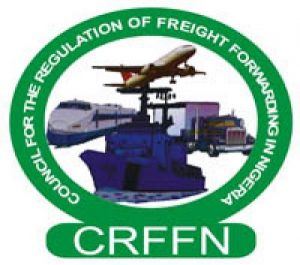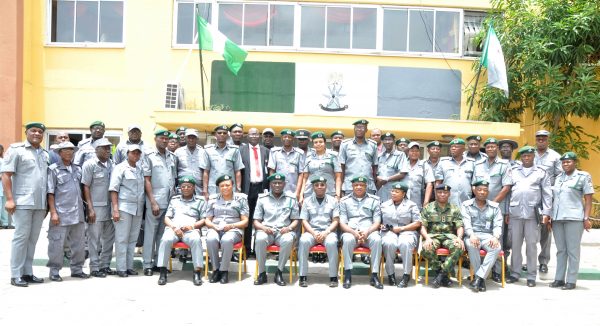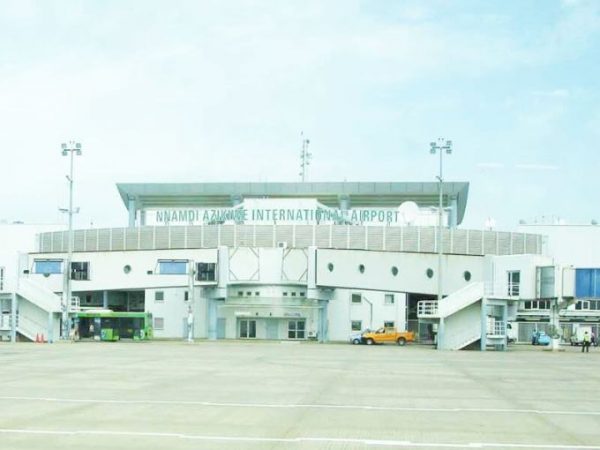Why Senate Stopped CRFFN Act Amendment
 CRFFN is a ‘quasi-government agency’
CRFFN is a ‘quasi-government agency’- Maritime sector inefficient, despite N299.6bn revenue – Experts
By Kenneth Jukpor
There are indications that the National Assembly’s moves to amend the Act establishing the Council for the Regulation of Freight Forwarding in Nigeria (CRFFN) was shelved as a result of a pending court case instituted by members of the National Association of Government Approved Freight Forwarders (NAGAFF).
Although freight forwarding veterans had posited that the amendment was an effort in futility as the input of practitioners wasn’t integrated, NAGAFF’s court case presently at the Court of Appeal is believed to the reason the legislative chambers abandoned the amendment.
Speaking with MMS Plus newspaper during an exclusive chat last week, the Founder of NAGAFF, Dr. Boniface Aniebonam made this assertion.
“Part of the Senate rules is that when a matter is pending in court, the legislative has to wait for the court judgment before making decisions on that matter. We wrote officially to the National Assembly; the Senate and the House of Representatives, informing them that the matter subject to amendment is pending in court” he said.
“What members of NAGAFF are contesting at the Court of Appeal is what is before the National Assembly for amendment. So, the situation can be described as laying an ambush against the judgment of the court. We are saying that CRFFN isn’t an agency of government but the CRFFN Act is before the National Assembly for amendment to state that it is an agency of government”.
According to the freight forwarding don, CRFFN was only an agency of government based on the pronouncement of the lower court. “The matter is pending at the Court of Appeal where members of NAGAFF are still insisting that CRFFN is not an agency of government. It is mere a quasi-government agency” he said.
“In a civil society, everyone is mandated to follow the rule of law; if the court has made an order to state that CRFFN is an agency of government, it has not in any form touched the body of the Act. The Act remains the same and this Act implies that the chairmanship of the Council as well as the vice chairman must be an elected member of the council whose name is the register of freight forwarders. This is what makes CRFFN a professional body”
However, he noted that freight forwarders were aware of the developments and politicking, adding that members of NAGAFF and their counterparts in ANLCA are well prepared to tackle issues headlong when they get into the Council.
He cited CRFFN Act amendment is also a good opportunity for the new Governing Council to resolve the issues.
“We will not continue to make such mistakes because at the onset, the CRFFN was positioned to fail because those who drafted the CRFFN Act where not in the Council. The intentions of those who drafted the CRFFN bill didn’t reflect the interest of the freight forwarders. We need to find out what the sponsors of the bill had in mind while drafting the bill” he added.
All efforts NAGAFF is making is for CRFFN to thrive because the body is good for the practice of freight forwarding in the country, it is good for the nation and also good for international trade.
According to him, loses in freight forwarding practice have become overwhelming because of the lack of knowledge among operators, thus, he proposed provision of education for such category of people as the solution. He stressed that CRFFN exists to solve this problem in order to guarantee professionalism in the business.
Meanwhile, a maritime lawyer, Barr. Emmanuel Nwagbara, corroborated Aniebonam’s thought that CRFFN shouldn’t be a government agency.
“Indeed it is a misconception to have CRFFN as a government agency. I have always taken the position that CRFFN shouldn’t be a government agency. It ought to be a body of freight forwarders which would regulate the practice of freight forwarding just like you have the Nigerian Bar Association (NBA) regulating the conduct of lawyers, Nigerian Union of Journalists (NUJ) for pressmen, Institute of Chartered Accountants in Nigeria (ICAN) for chartered accountants, among others” he said.
While he lamented that the government has made CRFFN a parastatal by enacting a law that created the agency, he dispelled claims that a pending court case led to the suspension of the proposed amendment.
“The body is already a government agency. My take is simply the legal position that CRFFN would continue to remain a government agency as the law stipulates and it would remain so until that law is revoked” he told MMS Plus.
All efforts to get the Council’s registrar, Mr. Mike Jukwe or the agency’s Public Relations Officer (PRO) Mrs. Chinyere Uromta were futile as MMS Plus sought to get insights on the state of the amendment at the Senate and the developments on the postponed inauguration of the CRFFN Governing Board.
While Jukwe asked our reporter to contact the agency’s spokesperson, Uromta ignored all calls and text messages from our correspondent.
Maritime Sector Operates Inefficiently, Despite N299.6bn Revenue
Despite making significant contribution to Nigeria’s revenue of N299.6 billion in 2017, the maritime sector has been analyzed to have been grossly inefficient compared to the economic potentials in the sector.
Experts at Afrinvest Research Limited, who made this report, have called on the Federal Government to maximize the huge economic potential of the maritime sector, to diversify the nation’s economy.
They argued that the Nigerian seaports have been underutilised and operated in a grossly inefficient manner despite its significant contribution to government’s revenue of N299.6 billion in 2017.
In their report on the review of the Nigerian economy and financial market for the first half of 2018, they pointed out that ocean going vessels decreased to 4,175 in 2017, from the 4,622 it was in 2016.
This, the report stated indicated reduced preference for Nigerian seaports as a result of poor infrastructure, duplicity of charges, inefficient service deliveries, high waiting period and increased Terminal Handling Charges (THC).
According to Afrinvest Research, “In addition, the Lagos port remains the most active due to its proximity to market and as a result, is often congested as the existing infrastructure for transportation of goods remains below par.
“We believe that improved operations and investment in these ports will boost competitiveness and flow of trade which will have positive spill-over effects on growth.
“Similarly, improving infrastructure in Nigeria would also boost the fiscal revenue base which further supports the goal of revenue diversification away from oil. Other sectors that will benefit from increased spending on infrastructure include agriculture, manufacturing and trade, all of which also have a catalysing impact on the economy at large.
“We recommend the adoption of more Public Private Partnership structures by the government as a more efficient route to driving infrastructural development as well as strengthening fiscal diversification.
“Furthermore, infrastructural development through effective utilization of earmarked funds will further drive real sector growth and improve trade competitiveness.”
The experts also stated that the widening infrastructural deficit had continued to hamper competitiveness and growth in the Nigerian economy.
They added, “To tackle this challenge, the National Integrated Infrastructure Master Plan (NIIMP) – which focuses on investing in transport, energy, ICT, social infrastructure, housing, security and agriculture – was drawn up in 2014.
“However, implementation of this plan has remained sub-optimal given the amounts budgeted for such critical sectors since then.
According to the NIIMP, an estimated total of $3.0 trillion will be needed to revamp and maintain Nigeria’s infrastructure. “The poor state of infrastructure in Nigeria is further buttressed by the understanding that the optimal proportion of infrastructure stock to GDP is at about 70 per cent; current level in Nigeria is between 20 – 25 per cent.
Furthermore, efforts and policies geared towards achieving this goal have been underwhelming as reflected in the deteriorating conditions of some of the key infrastructural dependent sectors of the economy.”
The group noted that the mission to achieve inclusive and sustainable growth has attracted global attention with a universal call to end poverty, protect the planet and ensure that all people enjoy peace and prosperity by 2030 as evinced in the 17 Sustainable Development Goals (SDGs).
According to the United Nations Development Programme (UNDP), despite the decline in the number of people living in extreme poverty (less than $1.25 a day), from 1.9 billion in 1990 to 836 million in 2015, 80.0 per cent of these people are in the South Asia and Sub-Saharan African regions.
“Furthermore, a recent report by the Brookings Institution using the World Poverty Clock data (June 2018) shows that Nigeria has become the extreme “Poverty Capital” of the World, overtaking India even though India’s population is 7.0x larger than Nigeria’s (73.0m extremely poor people in India account for 5.6 per cent of its population).
“Specifically, 86.7 million fall within the extreme poverty net. This is further aggravated by the estimated fast paced growth in its population by 2050 (estimated at 400 million people). This quagmire is traceable to the mismanagement and inefficient allocation of scarce resources by the government to key priority sectors that will propel a more inclusive and sustainable growth as well as eradicate poverty by a substantial amount in coming years” they said.







